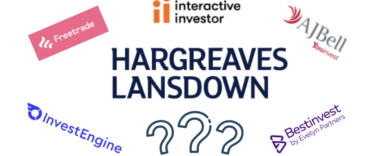 If you are looking for the best investment platform to invest your money with, both Charles Stanley* and Hargreaves Lansdown* are large, well-established options. In this comparison, we break down the key features of both platforms, looking at the advantages and disadvantages of each one to help you choose which is the best option for you.
If you are looking for the best investment platform to invest your money with, both Charles Stanley* and Hargreaves Lansdown* are large, well-established options. In this comparison, we break down the key features of both platforms, looking at the advantages and disadvantages of each one to help you choose which is the best option for you.
Charles Stanley vs Hargreaves Lansdown - which is better?
| Charles Stanley | Hargreaves Lansdown | |
| Services | Wealth Management
Discretionary Management Fund Lists Multi-asset funds "New to investing" guides |
HL Select Funds
Wealth Shortlist Ready-made portfolios Foreign currency exchange |
| Products | Trading account
ISA, General Invest Account (GIA), Junior ISA, SIPP |
Active Savings
Cash ISA Fund and share account ISA, General Investment Acount (GIA), Lifetime ISA (LISA), Junior ISA, SIPP, Junior SIPP |
| Minimum investment | No minimum investment for those managing their own investments | £1 for a fund and share account
£100 for an ISA or SIPP (or a regular £25 per month) |
| Fees | Annual charge - 0.30% (min £60 and max £600 per annum)
Online trading charge (after Trading Credits have been used) - £10 for shares and £4 for funds FX fees (trade value): £0 - £9,999 - 1% £10,000 - £49,999 - 0.75% £50,000 - £499,999 - 0.50% No platform or trading charges when you buy or hold one of Charles Stanley's Multi-Asset Funds
|
Fund investment platform charge:
Up to £250,000 - 0.45% £250,000-£1m - 0.25% £1m-£2m - 0.10% Over £2m - 0% Additional underlying fund charges Dealing charges (based on deals completed in previous month): 0-9 deals - £11.95 10-19 deals - £8.95 20+ deals - £5.95 No charge for holding shares No charge for Junior ISAs |
| Customer reviews (Trustpilot) | 2.0/5.0 | 4.2/5.0 |
Charles Stanley vs Hargreaves Lansdown - services
Both Charles Stanley and Hargreaves Lansdown offer services ranging from those aimed at people starting out in investments through to more sophisticated investors and those with more substantial amounts of money to invest. In this latter area, Charles Stanley has a range of wealth management, discretionary management and inheritance tax management services available. For Hargreaves Lansdown, meanwhile, it offers high quality independent research, a user-friendly interface and options including spread betting and CFDs for more experienced investors.
Both platforms have their own multi-asset funds, while Hargreaves Lansdown also offer ready-made portfolios. They also both have lists of their recommended funds.
Charles Stanley vs Hargreaves Lansdown - products
While both Charles Stanley and Hargreaves Lansdown have a good range of products available, including trading accounts, Hargreaves Lansdown has both a Lifetime ISA and a Junior SIPP, which Charles Stanley doesn't. However, Charles Stanley does have a flexible ISA, which means investors can take out money from their ISA account and put it back in during a single tax year without it affecting their ISA allowance. This is quite rare among investment platforms and may be an attractive feature for some investors.
Charles Stanley vs Hargreaves Lansdown - minimum investment
While Charles Stanley has no minimum investment requirements for those happy to manage their own investments online, Hargreaves Lansdown has different requirements for different products. There is a £1 minimum investment for its fund and share account, while its ISAs and SIPPs require £100 as a lump sum or a regular monthly payment of £25 per month.
Charles Stanley vs Hargreaves Lansdown - fees
Charles Stanley represents good value with a flat 0.30% annual fee capped at £600. This doesn't include the underlying fund charges, which will alter depending on the underlying funds held in the portfolio. Trading shares costs £10 while trading funds costs £4. All account holders receive £50 worth of credits every six months which can be used to trade for free. This translates to up to 5 free share trades.
Hargreaves Lansdown can provide good value for money when it comes to trading as well. This is because, although its headline trading fee of £11.95 is more expensive than Charles Stanley's fee of £10, that cost drops the more trades you complete per month. Hargreaves Lansdown recently scrapped its charges for Junior ISAs and introduced reduced charges for its Lifetime ISA.
In order to understand which option will offer you better value, you need to assess what you are likely to invest in and how often you are likely to make changes if you opt to invest in investment trusts, ETFs or shares.
Charles Stanley vs Hargreaves Lansdown - customer reviews
According to independent customer review site Trustpilot, Hargreaves Lansdown is rated more highly by its users than Charles Stanley, getting 4.2 out of 5 stars. Charles Stanley, meanwhile, was awarded 2.0 out of 5, meaning it is categorised as "poor" compared with Hargreaves Lansdown's "Excellent". Overall, there was a clear division between those who thought Charles Stanley was "Excellent" (21%) and those who deemed it to be "bad" (43%). The negative reviews generally centred on issues with using the site or logging on to the mobile app. It is worth noting, however, that with fewer than 20 reviews, compared with more than 10,000 for Hargreaves Lansdown, there's a strong possibility this isn't representative of the average customer experience as a whole.
Summary: Charles Stanley vs Hargreaves Lansdown
The choice between Charles Stanley* and Hargreaves Lansdown* mainly comes down to what you are likely to invest in, how much you are looking to invest and whether you require a specific product or service. If you are only investing in funds, Charles Stanley offers a flat 0.30% platform fee capped at £600. However, if you want to trade investment trusts, ETFs or shares, it may end up cheaper to invest with Hargreaves Lansdown if you are likely to be undertaking multiple monthly trades.
A big appeal of Charles Stanley is its flexible ISA, although if you are looking specifically for a Lifetime ISA or Junior SIPP, you will only get those with Hargreaves Lansdown. Moreover, if you value an easy-to-use website, high-quality research and investment guides and the option to access spread betting or CFDs, Hargreaves Lansdown may be the better option.
For more detailed information, read our Hargreaves Lansdown review and Charles Stanley review.
If a link has an * beside it this means that it is an affiliated link. If you go via the link Money to the Masses may receive a small fee which helps keep Money to the Masses free to use. But as you can clearly see this has in no way influenced this independent and balanced review of the product. The following link can be used if you do not wish to help Money to the Masses - Hargreaves Lansdown, Charles Stanley




